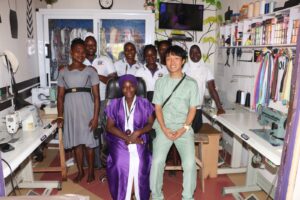
National Kaizen Project: Japanese Volunteer helps local businesses embrace Kaizen and improve productivity in the Ashanti Region
The concept of BRCs was introduced by the Ministry of Trade and Industry (MOTI) in 2017, through the Rural Enterprises Programme (REP) with support from GEA.
The Japan International Cooperation Agency, JICA, through its international volunteerism scheme, Japan Overseas Cooperation Volunteers, JOCV, is actively supporting Ghana across various sectors, with a primary focus on health, education, trade and industry. The technical cooperation project “Enterprise Development with Kaizen” implemented by Ghana Enterprise Agency (GEA) and JICA, is helping businesses in Ghana adopt the world-class principles of Kaizen. Kaizen is a Japanese business improvement term which means ‘change for the better’ or ‘continuous improvement’.
In Mampong, a town in the Ashanti region of Ghana, local businesses are gradually embracing the Kaizen principle and they are experiencing improvements in their business processes, turn-around time and overall productivity.
Afi Juliana Yamanu, owner of a small-scale gari-manufacturing outfit called the Beatee Agro-processing company, shared her experience through her daughter, Beatrice Ayawo: “We have embraced kaizen here and it has improved how we do things. In the past, our factory was distorted and things were not well arranged.”
“Now, we have compartmentalized our space and labelled each section accordingly. Currently, we have clearly demarcated areas such as the washing, peeling, processing and pressing units. This is helping us to work faster and reduce the time we use in moving around our formerly cluttered factory. We have also improved our daily output from one and a half bags to three bags.”
The Head of the Mampong Business Resource Centre (BRC), Mr. Alexander Nyame who travelled to Japan recently on a training course praised the Japanese government for committing resources to the development of the Small and Medium-scale Enterprises (SMEs) in Japan.
According to him: “The Japanese government is highly committed to the growth and development of SMEs. They have established very effective and efficient support-institutions for their SMEs and these institutions function in unison and complement one another. This is a good example we can learn from and improve our Business Resource Centres (BRCs).”
The BRC is a one-stop enterprise support centre at the district level designed to provide a broad range of Business Development Services (BDS) to potential and existing entrepreneurs and enterprises. They also operate as financial and investment facilitation hubs and business information repositories for Micro, Small and Medium Enterprises (MSMEs).
The concept of BRCs was introduced by the Ministry of Trade and Industry (MOTI) in 2017, through the Rural Enterprises Programme (REP) with support from GEA. The introduction of the BRCs is part of the institutional support interventions designed under the Government of Ghana’s Industrial Transformation Agenda to develop the MSMEs sector.
Talking about the challenges facing MSMEs in the Mampong area, Mr. Nyame intimated that some MSMEs are stuck in their old ways of doing business and unable to manage their production processes efficiently. “Others have not refined their processes, so they lose a lot of their inputs and raw materials in the course of production. A lot more have challenges with inventory.”
However, he was quick to add: “We are very grateful to JICA. Mr. Yabushita, the Japan Overseas Cooperation Volunteer assigned to us, is very resourceful and always willing to go the extra mile to help businesses at our Centre. He introduced the Kaizen Convention, a concept to propagate the principles and basic tenets of Kaizen to local businesses. During the Kaizen Convention, more than 240 businesses participated. A lot of them have learnt things like streamlining their production time, arranging their work area to avoid confusion and repetition of efforts, making extra effort at improving the quality of their products and doing things right in other to eliminate unnecessary waste.”
Mr. Yabushita, who is in the process of establishing a Kaizen Club for local businesses in Mampong explained that: “I share knowledge to ensure that businesses develop and flourish. I noticed that companies in Mampong have the potential to do better and a lot of them are willing to learn simple Kaizen ways of improving their businesses. The improvements I see with some of these businesses is a great encouragement for me to do more by teaching them and monitoring their progress. I believe their success story can be replicated not only in Mampong, but across the entire country.”

Ms. Jennifer Mortson, owner of Mort-Jenn Fashion Enterprise, was full of praise for the Kaizen training she had together with her workers. In her words: “One of the greatest improvements we have experienced through Kaizen is our ability to identify the sewing talent of our workers and encourage them to specialize in it. Now, we have the right people doing the aspects of the job they are able to do best. We have also streamlined our activities and re-arranged our factory to ensure efficiency. The time we used to sew two dresses, we use the same time to produce five dresses now. My workers are happy and they say when they establish their own outfits, they will implement kaizen there.”
Beyond Kaizen and business improvement training programmes delivered by Mr. Yabushita, he is training some workers at the Mampong BRC on the effective use of technology and various business software. Management of the BRC is making arrangement for him to transfer his computer skills and knowledge to staff of the Centre and other local businesses around Mampong.

